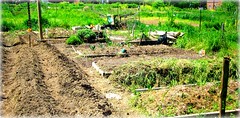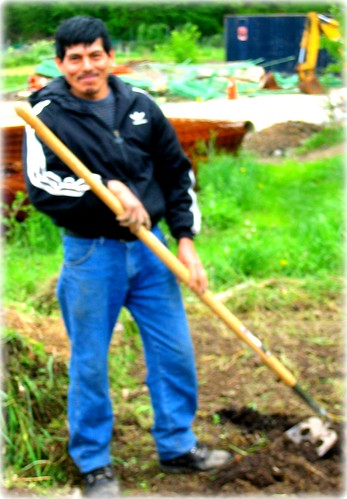i just came back from working all day at the garden. The day was perfect; sunny, a little windy, and a very loose soil after two days of rain. Marcos, a dishwasher at the restaurant where i have a part-time, showed me how corn and beans are cultivated in his native Honduras.

Whenever i meet a latino, i always ask them what they grew. Their reaction to the question is one of surprise to amazement as i keep asking them about their agricultural practices, fertilizers, prices, and many other things related to the life they have left behind. It's almost as if they were ashame of their past.
Unfortunately, in many parts of the world, agriculture is seen as a backwards practice, associated with poverty and stagnation. Development, according to many, is leaving agriculture to most prosperous and profitable urban and industry sectors. But in light of the recent events, this prevalent view must be revisited. And i'm not taking about paying more attention to agriculture, i argue that agriculture must be the central component in the development strategies of many countries. The price incentives are there, the research is there, the people is there; so what's is missing? not sure, maybe leadership to get out of the status quo, political will to question the traditional wisdom of policy makers.
But lets go back to Don Marcos. He, like many, got to a point in which he had to choose between the Maquilas or the north. Agriculture just gave him "enough for the day" and with the price of inputs getting more expensive he had to make a decision. Having a nephew in Washington he opted for the states. He arrived about a year and a half ago, and since the first week he's been working almost non-stop at a cafe and a restaurant. He kept asking me questions about my garden that today i decided to bring him with me.
Together, we planted some corn, beans, and squash. I kept asking him questions as i try to get as much information as possible from his past live in my effort to understand what leads a man to leave behind his wife, children, and land for a steamy room filled with food craps. I guess it all boils down to food: later that day as we ate perubian chicken in a nearby rotisserie, he told me that his family could only afford meat once a week, sometimes even every two weeks. Today, thanks to the remittances his family is eating a lot better with lots meat and dairy, a luxury that millions can't afford nowadays.

PS As we till the soil and almost as an Aztec sign, a snake came up from the weed, i kept looking for the eagle but no luck there...


No comments:
Post a Comment